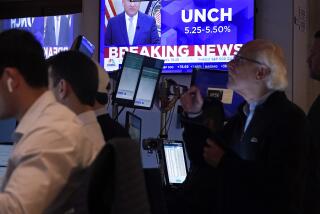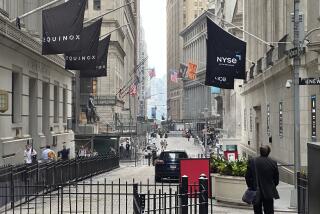Wall Street rises with hopes U.S. may avoid default

Wall Street rallied Wednesday on hopes that the U.S. government can avoid a potentially disastrous default on its debt.
The Standard & Poor’s 500 index climbed 1.2%, with much of the gain coming after President Biden said he’s confident “America will not default.” The Dow Jones industrial average rose 1.2%, while the Nasdaq composite gained 1.3%.
Biden’s comments came after House Speaker Kevin McCarthy (R-Bakersfield) said late Tuesday that Democrats and Republicans could reach a deal by the end of the week, though the two sides remain far apart. They’re staring down a June 1 deadline, which is when the U.S. government could run out of cash unless Congress allows it to borrow more.
A default could rock the financial system because Treasury bonds are seen as the safest investment on Earth, and economists say a default probably would cause widespread damage across the economy.
Wednesday’s spurt came after a long, listless stretch in which the S&P 500 did not move by 1% over a week, up or down, for six straight weeks. That’s its longest such stretch since 2019.
Congress has raised the nation’s debt limit many times in the past, and most have occurred without much effect on the stock market, according to Chun Wang, senior research analyst at Leuthold. The fear is something similar to 2011 occurring.
That’s when Standard & Poor’s cut its credit rating for the U.S. government as it dithered in raising the debt limit. The downgrade coincided with a debt crisis flaring in Europe, and together they sent Wall Street on a neck-snapping roller coaster for a week.
Stocks of companies that get much of their revenue from the federal government, and thus may have much to lose if it can’t pay its bills, rose Wednesday. Lockheed Martin climbed 2.1% and Northrop Grumman gained 2.7%.
Economically speaking, the vibes are off. Here’s what you should be doing with your money, according to financial experts.
The debt negotiations are just one of the issues hanging over Wall Street. Worries are also high about a possible recession hitting later this year because of much higher interest rates meant to get inflation under control.
One of the main positives that’s kept the economy out of a recession so far has been resilient spending by U.S. households. They’ve continued to spend even as manufacturing, the U.S. banking system and other parts of the economy have cracked under the pressure of high rates.
Target offered some potentially encouraging data on the strength of shoppers when it said its profit fell by less last quarter than analysts feared. But it also said that it’s seeing softening sales trends early this year, and it did not raise its forecast for full-year earnings. Its stock rallied 2.6%.
A day earlier, Home Depot raised worries when it cut its financial forecasts for the year after highlighting broad-based pressures across its business. Walmart is the next big retailer to report its results, and it’s coming up Thursday.
Inflation has a way of affecting nearly every aspect of your finances, including the size of your tax refund and your retirement contributions.
Retailers are among the last of big U.S. companies to report their profits for the start of the year. Most companies in the S&P 500 have turned in earnings that were better than analysts feared. But they’re still on pace to finish with a second straight quarter of drops in profit from year-earlier levels.
Besides the “profit recession” underway, pressures in the U.S. banking industry have also raised worries on Wall Street. Investors have been on the lookout for the next possible weak link after three high-profile failures since March.
Banks are struggling with high interest rates, which have caused some customers to pull their deposits in search of higher yields at money market funds and other accounts. The increase in interest rates over the last year has also knocked down the values of many of the loans and bonds that banks own.
Much scrutiny has been on Western Alliance Bancorp and other smaller and midsize banks, leading to wild swings in their stock prices. Western Alliance recovered some of its losses after it gave an update on its deposit levels through Friday, among other data. It jumped 10.2% on Wednesday, though it’s still down 41.6% for the year.
PacWest Bancorp, another bank under heavy scrutiny, rose 21.7%, trimming its loss for the year to 75.8%.
All told, the S&P 500 rose 48.87 points to 4,158.77. The Dow advanced 408.63 points to 33,420.77, and the Nasdaq added 157.51 points to close at 12,500.57.
In the bond market, Treasury yields were ticking higher. The yield on the 10-year Treasury rose to 3.57% from 3.54% late Tuesday. It helps set rates for mortgages and other important loans.
The two-year yield, which moves more on expectations for action by the Federal Reserve, rose to 4.16% from 4.08%.
In markets abroad, Japan’s Nikkei 225 gained 0.8% after data showed that the world’s third-largest economy grew at its strongest pace since April-June 2022.
Stocks fell 2.1% in Hong Kong and were mixed amid modest movements in Europe.
AP writers Yuri Kageyama and Matt Ott contributed to this report.
More to Read
Inside the business of entertainment
The Wide Shot brings you news, analysis and insights on everything from streaming wars to production — and what it all means for the future.
You may occasionally receive promotional content from the Los Angeles Times.












